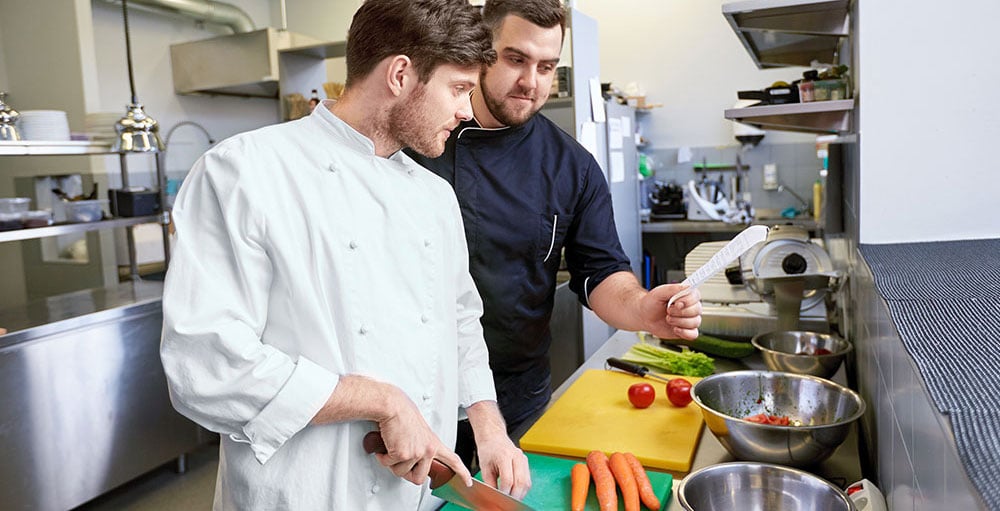Steps to Getting Your florida food handlers card Quickly and Hassle-Free
Steps to Getting Your florida food handlers card Quickly and Hassle-Free
Blog Article
Increase Your Job Opportunities: Why a Food Handler Certificate Is a Must-Have in the Culinary Market
In today's affordable cooking landscape, the importance of a food trainer certification can not be overstated. This credential not just mirrors a person's devotion to maintaining food safety and security standards however likewise works as a critical property in enhancing employability within the industry. As restaurants and food service establishments significantly focus on qualified personnel, professionals geared up with this accreditation stand to acquire a considerable advantage. However, the implications of this certification extend past plain employability; they can likewise affect wage possible and occupation progression. Discovering these facets exposes a much deeper understanding of why this certification is a strategic financial investment for cooking professionals.
Significance of Food Security
In the culinary sector, the importance of food safety and security can not be overemphasized. Guaranteeing the security of food is extremely important for protecting public health and wellness and preserving customer depend on. Infected food can lead to major health and wellness problems, consisting of foodborne health problems, which can influence people and lead to considerable obligation for food facilities. For that reason, applying rigorous food security techniques is vital for any kind of culinary procedure.
Food safety and security encompasses a variety of procedures, consisting of appropriate food handling, storage, cooking, and serving techniques. Abiding by these techniques not only reduces the danger of contamination yet additionally aids in abiding with neighborhood wellness policies. Proper training in food safety makes it possible for cooking specialists to identify possible dangers and execute precautionary steps successfully.
In addition, a strong dedication to food safety and security can boost the track record of a culinary establishment, fostering customer commitment and company development. Consumers are significantly familiar with food safety concerns, making it important for food trainers to demonstrate their adherence to ideal methods. Ultimately, focusing on food safety is not simply a regulatory need; it is a fundamental facet of offering top quality food service and securing the well-being of consumers.

Qualification Requirements
Food security techniques are only as reliable as the individuals executing them, making certification an essential action for food handlers in the cooking industry. To acquire a Food Trainer Certification, prospects have to usually finish a training program that covers crucial subjects such as foodborne illnesses, sanitation, personal hygiene, and risk-free food managing methods.
The majority of qualification programs are designed to accommodate various learning styles, providing options for online, in-person, or hybrid styles. Participants should pass an assessment to show their understanding of the product, with a minimal passing score commonly evaluated 70%.
The period of training can differ, with some programs needing just a few hours, while others might cross numerous days. After successfully completing the course and exam, candidates receive their certification, which is typically legitimate for 3 to 5 years, relying on regional guidelines.
Revival often involves retaking the program or finishing a refresher program to guarantee that food handlers remain upgraded on the most up to date methods and standards. Conformity with these qualification demands not only boosts specific understanding however also adds to the total security and quality of food solution procedures.
Job Market Need
Just how has the task market for food handlers advanced recently? The demand for food handlers has dramatically raised, mainly driven by the growing awareness of food safety and security and health among consumers and regulatory bodies. With the surge of foodborne health problems, dining establishments, providing my latest blog post services, and food production firms are focusing on the hiring of licensed food handlers to ensure compliance with health laws. This change has brought about a heightened focus on food safety training and qualification as prerequisites for work in the culinary sector.
Additionally, the expanding dining establishment industry, especially with the introduction of food distribution services and food trucks, has created a wealth of work opportunities for food handlers. The need for skilled personnel who can safely prepare and manage food has actually come to be extremely important. servsafe food handler certificate. Furthermore, as culinary companies embrace a lot more rigorous safety and security methods, the value of a food handler certificate has increased, making it an essential property for job hunters
Because of this, people entering the culinary workforce are locating that getting a food handler certification not just enhances their employability however also positions them favorably in a competitive job market that progressively prioritizes food safety and hygiene standards.
Advantages of Qualification
Acquiring a food handler certification uses numerous benefits that substantially improve a professional's standing in the cooking market. It shows a dedication to food security and health, which is critical in avoiding foodborne diseases. servsafe food handler certificate. This certification equips people with essential expertise pertaining to secure food managing methods, consisting of correct link storage, cooking temperatures, and hygiene treatments
Furthermore, possessing a food trainer certificate can increase a person's employability. Numerous employers prioritize prospects with this accreditation, watching it as an indicator of expertise and proficiency. This can lead to far better work opportunities and possibly higher salaries, as certified people are typically handed over with higher responsibilities.
Furthermore, the qualification fosters a culture of security and accountability within the work environment. It not only enhances a worker's confidence in their abilities however also advertises a more secure environment for consumers and coworkers alike. Last but not least, preserving a food handler certificate can open doors to additional academic and occupation innovation possibilities within the cooking area. try this Generally, this qualification is a critical investment that profits both professionals and the facilities they offer, inevitably adding to a flourishing culinary market.
Steps to Get Licensed
Obtaining a food trainer certificate involves a simple process that can establish people on a course to boosted job leads in the cooking sector. The very first step is to locate an approved program or training provider that offers food safety training courses. Many companies supply both in-person and on the internet options, enabling flexibility in learning.

After effectively passing the examination, individuals will receive their food trainer certification, which is often legitimate for a specific period, typically three to five years. To maintain certification, it may be essential to complete refresher course programs or retake the examination before the expiry day.
Last but not least, it is necessary to verify any type of local or state-specific laws regarding food trainer certification, as demands can differ. By complying with these steps, people can obtain their qualification and substantially improve their employability in the affordable culinary landscape.

Verdict
Finally, getting a food handler certificate is vital in the culinary market, as it makes sure adherence to food safety and security criteria and enhances employability. With the expanding need for qualified employees, this credential not just opens doors to job chances yet also adds to occupation advancement and boosted gaining potential. Ultimately, a food handler certification signifies a dedication to safety and professionalism and trust, promoting a society of responsibility that benefits both employees and employers in the food solution industry.
Report this page